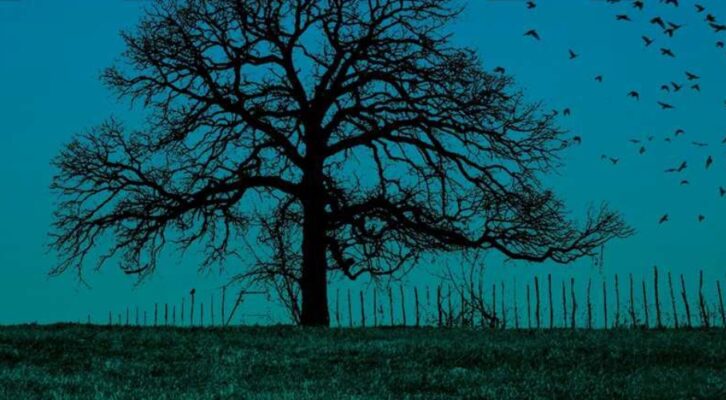
Sakiru Adebayo on the Diasporization of African Literature
Writing Without the Certainty of Return
There is no denying that African literature is having a moment on the global literary stage. In 2021, African writers took the literary world by storm. It is in light of this that the South African writer Damon Galgut said in his acceptance speech at the 2021 Booker Prize ceremony that “2021 was a great year for African writing.” Galgut’s comment pointed, specifically, to the fact that so many of the major global literary awards in that year went to African writers.
Let’s take stock: David Diop won the 2021 Man Booker International Prize for his novel, At Night All Blood is Black. Veronique Tadjo, the Ivorian writer, won the Los Angeles Times Book Award for her novel, In The Company of Men while the France-based Senegalese writer, Mohammed Mbougar Sarr, won the prestigious Prix Goncourt for his novel, La Plus Secrete Mémoire des Hommes. In this same 2021, the UK-based Ugandan writer, Jennifer Nansubuga Makumbi, won the Jhalak Prize for her novel, The First Woman while the veteran Zimbabwean writer, Tsitsi Dangaremba, won the PEN Pinter Prize and the Peace Prize of the German Book Trade.
Meanwhile, in the Lusophone world, the Mozambican writer, Pauline Chiziane, took home the most prestigious literary prize for any piece of literature written in Portuguese, the Camōes Prize. In North America, the Nigerian-Canadian poet, Tolu Oloruntoba, won the prestigious Governor General’s Literary Award for his book of poetry, The Junta of Happenstance, while the Nigerian-American writer, Tope Folarin, won a Whiting Award for Fiction.
To crown it all, the Tanzanian-British writer, Abdulrazak Gurnah, won the most prestigious literary award in the world: the Nobel Prize. But the glut of literary recognition for African writers did not end in 2021. In 2022, Boris Diop won the prestigious Neustadt International Prize for Literature while Noviolet Bulawayo’s novel Glory was shortlisted for the Booker Prize (the second time Bulawayo has appeared on the Booker shortlist).
There are many ways of thinking about this flood of global recognition of African writing. Does it, for instance, mean that the world has finally woken up to the genius of African writing? Is it an invitation for African writers to take their pride of place in world literature’s hall of fame? Or is it in any way an aftermath of the death of George Floyd in 2020, an incident that inspired global protest against anti-blackness and exposed the deeply ingrained institutional prejudices against people of African descent?
Could this global recognition of African literature be a compensatory gesture for all the historical sufferings inflicted on the continent by the (Euro-American) countries from where these awards are administered? Does it even matter that most of the winners of these awards are Africans living abroad?
It is this last question about the diasporic circumstances of African writers and writings that interests me. Whether one is referring to the lived transnationality of African writers or the diasporic nature of their writings, there seems to be a debate among critics about the prospects of reading contemporary African literature as diasporic literature.
This debate became most heated in 2013 when the Nigerian-American writer, Tope Folarin, won the Caine Prize for African writing for his short story, “Miracle”, a story about a Nigerian evangelical church in Texas. Some critics felt that Folarin should not have won the prize because he was not based on the continent and did not write about the experiences of continental Africans. However, the Caine Prize Advisory Board as well as other literary award-giving bodies on the continent have laid this debate to rest by defining an African writer as anyone from any part of the world who is a national of an African country, or who has a parent who is African by birth or nationality.
Truth be told, when one thinks of contemporary African writers, the names that immediately come to mind include the likes of Chimamanda Adichie, Teju Cole, Mohamed Mbougar Sarr, Taiye Selasi, Mbolo Mbue, Maaza Mengiste, Akwaeke Emezi, Noviolet Bulawayo, all of whom are either based in the diaspora or write about Africans living in the diaspora. Maybe this is why one of the foremost African literary critics in contemporary times, Cajetan Iheka, writes about the “transnational and diasporic turn” in African literature.
However, even before Iheka, Ambroise Kom argued as early as 1997 that African literature is orphaned literature because most of its writers and critics have become increasingly diasporic. It is clear, then, that the literature of exiled and diasporized African people (often referred to as Afrodiasporic/new African diasporas/global African/postcolonial African diaspora literature) is not a new development. Depending on what one is trying to achieve, this kind of literature can be traced as far back as 1789, when Olaudah Equaino wrote The Interesting Narrative of the Life of Olaudah Equaino, or Gustavus Vassa, the African, a memoir that details the experiences of an enslaved, and later freed, African man in England, the United States, and the West Indies.
There is no denying that African literature is having a moment on the global literary stage.
After the abolition of the transatlantic slave trade and during the period of European colonial expansion on the continent, African writers also wrote profusely about the experiences of Africans living in the West. A prominent example here is J. E. Casely Hayford’s Ethiopia Unbound (1911), a novel that, amongst many other things, details the experiences of an African student living in London. There is also the 1915 play, The Blinkards, by Kobina Sekyi, which satirizes the group popularly known as the ‘Been-tos’ (the Africans who lived in Europe for a little while but started behaving like Europeans on their return to the continent).
At the tail end of the colonial era and the early start of decolonization, we had Olabisi Ajala’s An African Abroad (1963), a travel memoir that recounts an African man’s solitary travel to India, Australia, the Soviet Union, and the Middle East in the 1950s and 1960s. There was also the profoundly haunting account of a Senegalese woman working as a domestic servant in France in Ousmane Sembene’s (1962) short story, “Black Girl”, which was later adapted into a movie in 1966. Additionally, the Nigerian playwright, J.P. Clark, wrote about his stay in the US in the early 1960s in America, their America (1964) while the Ghanaian novelist, Ama Ata Aidoo, returned us to the ‘Been-to’ trope in her debut novel, Our Sister Killjoy (1977).
One common trope in most of the literature of the African diaspora during the late colonial and early decolonial periods is the certainty of return. The main character (born in Africa) often returns to their home country and is expected to contribute to national development in their home country. This is where postcolonial African diaspora literature departs from its predecessor.
In the new African diaspora narratives, we are witnessing the ways in which postcolonial disenchantments simultaneously complicate the question of return and devitalize rigid attachments to the nation-state. In essence, the crisis of postcoloniality (which led to the production of hyphenated identities for many African writers) makes the question of the diaspora impossible to ignore not only in the lives of African writers but also in their writings.
It goes without saying that this debate about the diasporization of African literature is situated within the politics of reading and artistic valuations as well as the complicated terrain of global publishing. In grappling with this debate, one needs to ask: which African writers have access to giant Western publishers such as Knopf and Random House? Which African literary texts are chosen for book clubs around the world? And which contemporary African writings are literature professors teaching?
Also, it is pertinent to note that the discourse of the diasporization of African literature seems more prevalent in the Anglophone literary world and that most of the so-called new/global African diaspora writers are, more often than not, published in Britain and especially the United States. To put it bluntly, the debate about the diasporization of African literature is in many ways a debate about the Americanization of African literature.
There are, of course, Africans writing from other parts of the diaspora (think of Cristina Ali Farah, Olumide Popoola and Ingy Mubiayi, whose works represent the different communities of the new African diasporas across Europe), but there is still an obstinate dominance of Anglo-American African writings. For instance, not a lot of people in the Anglophone African literary circle are aware that the famous novel, On Black Sisters Street, by the Belgian-Nigerian writer, Chika Unigwe (who, by the way, now lives in the US) was first published in Dutch as Fata Morgana. The book swept the literary world by storm and went on to win many literary awards only after it was published into English in 2009.
There is an underlying regional politics in the publication and circulation of the new African diaspora literature that is worth emphasizing here. That is, while conversations about new Afrodiasporic literature revolve unrepentantly around Anglophone literature, they also seem to have a representational dominance of writers of West African (especially Nigerian) descent.
One way to explain this reality is the differentiated colonial legacies and postcolonial realities among African countries. For instance, the Structural Adjustment Programmes (SAP) and post-independence conflicts in the 1970s and 80s impelled many West Africans to look westward for greener pastures. The grim postcolonial realities (along with the US immigration acts of 1965 which allowed Africans to migrate to the US) produced West African diasporas that have now come of age in the West.
Furthermore, in the case of Nigeria (the most populous nation in Africa, with a sizeable contemporary diaspora compared to many other African nations), the successive military rules in the 1980s and 90s destroyed the country’s publishing industry so much that many Nigerian writers started seeking out Western publishers, which, invariably, influenced the extroverted content of most of the country’s literature.
The situation is completely different in a place like South Africa. The post-apartheid political and economic situation has not become so dire that it would warrant a Black South African literary diaspora, at least not at the scale of Nigeria (I am aware that there is an entire world of literature produced by South Africans in the diaspora during the days of anti-apartheid struggles, but I am referring here to the more contemporary South African writings).
Also, South Africa’s publishing industry is one of the strongest on the continent, hence, unlike many West African writers, contemporary South African writers are not obliged to look westward for the publication of their works. Remaining with African writing written in English, in a place like postcolonial Zimbabwe where the publishing industry is also affected by the country’s dire economic situation, Zimbabwean writings today (even when published outside of Zimbabwe: think of Petinah Gappah and Tsitsi Dangaremba) tend to favour localized Zimbabwean experiences over diasporic ones.
Even Noviolet Bulawayo, who might be thought of as an exception here, sets her second novel (also published in the West) in a country that is unmistakably Zimbabwe. Bulawayo is not the only African writer who returned to focusing solely on continental Africa after gaining popularity for writing about the new African diasporas. The Cameroonian-American writer, Imbolo Mbue, also returns to set her second novel, How Beautiful We Were, on the continent, after gaining critical acclaim for writing about a Cameroonian family in America in her first novel, Behold the Dreamers.
And in a place like Angola, where postcolonial economic and political conditions have turned local publishing into a struggle, many contemporary Angolan writings, which are often first published in Europe and sometimes in Brazil (I am thinking of Agualusa, Ondjaki and Epalanga’s works here), are still obstinately set in Angola and solely about Angolans at home.
Moreover, a quick look at recent francophone African writings translated into English (Veronique Tadjo’s In The Company of Men, David Diop’s At Night All Blood is Black, Boubacar Boris Diop’s Kaveena, Alain Mabanckou’s The Death of Comrade President and others) shows that most of our French-speaking African writers, even when based in the diaspora, still have an unwavering commitment to writing about continental African lives and experiences.
In all, postcolonial African diaspora literature is a genre that is continuously being made, unmade, and remade, so one cannot make totalizing or conclusive claims about its production or its future. One must also reckon with the fact that the distinction between the African and the diasporic African experience is often blurred in many of these contemporary literary works.
Therefore contemporary African diaspora narratives are changing the way we think about migration; they are showing us how it is not just about moving from one place to another but the installation of movements within places, the relativization of spaces, and the paralleling of localities. To borrow Derek Attridge’s words in his reading of Zoe Wicomb’s October, contemporary African diaspora narratives prove that geography is not only a matter of map but also a lived reality, one that is always shrinking and expanding.
Sakiru Adebayo
Sakiru Adebayo is an assistant professor of African Literature in the Department of English at the University of British Columbia, Okanagan. He is the author of Continuous Pasts: Frictions of Memory in Postcolonial Africa (University of Michigan Press) and the winner of the 2022 Nigerian Prize for Literary Criticism.



















